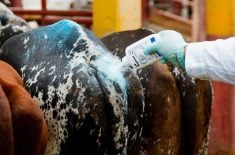British Columbia will develop its own system of provincial meat inspectors, the government announced Feb. 22.
Agriculture minister Norm Letnick said the province is in the process of filling 43 positions as it takes steps to take over meat inspection once the current agreement with the Canadian Food Inspection Agency expires Dec. 31.
The CFIA will continue to inspect federally licensed plants and a new provincial system will handle inspection in B.C.’s provincial plants.
“Our new provincial meat inspection system strikes an important balance, and we took the time to do it right. The new system will protect public health, animal welfare, and expand economic opportunities for farmers, processors and communities,” Letnick said in a news release.
Read Also

Beijing lifts some tariffs on U.S. farm goods but soybeans stay costly
China will suspend retaliatory tariffs on U.S. imports, including duties on farm goods, after last week’s meeting of the two countries’ leaders, Beijing confirmed on Wednesday, but imports of U.S. soybeans still face a 13 per cent tariff.
He said in a later news conference that consultations with various parties involved in the meat and poultry food chain led to a decision for a full inspection system from pre-slaughter through to packaging.
The Friday announcement included plans for a two-year pilot project in the North Okanagan region that will see up to five Class E licenses issued. This type of licence is issued to operations that slaughter and sell up to 10 animals per year and market the meat directly to consumers.
Vast areas of the province are far away from established slaughter facilities, so the province will put a mobile abattoir in 100 Mile House.
Letnick said there is money in the budget for several other mobile slaughter plants, and communities can apply for them if they meet specific criteria.
The new provincial meat inspection system budget is $6.7 million in the first year and is expected to cost $5.6 million annually after that.
B.C. has 60 Class A and B facilities, which have no volume or sales restrictions within the province, and 92 Class D and E licences, which allow on-farm slaughter with volume and sales restrictions in the region where the licence was issued.
The B.C. Cattlemen’s Association and B.C. Association of Abattoirs, among other interested groups, expressed support for the coming new system.















